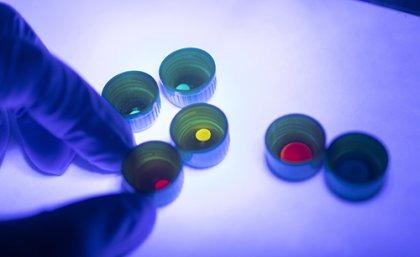Pioneering research led by scientists from The University of Queensland (UQ) could offer a solution to fixing cracked phone screens.
 Luminating composite glasses. Image Credit: The University of Queensland.
Luminating composite glasses. Image Credit: The University of Queensland.
The international team of researchers, headed by UQ’s Dr Jingwei Hou, Professor Lianzhou Wang, and Professor Vicki Chen, has unraveled the technology to prepare next-generation composite glass for lighting LEDs and smartphone, computer, and television screens.
The results of the study will allow the making of glass screens that are not just unbreakable but also display crystal clear image quality.
According to Dr Hou, the discovery was a great leap forward in perovskite nanocrystal technology because previously researchers could only produce this technology in the bone-dry environment of a laboratory setting.
The emitting materials are made from nanocrystals, called lead-halide perovskites. They can harvest sunlight and concert it into renewable electricity—playing a vital role in low-cost and high-efficiency new generation solar cells and many promising applications like lighting. Unfortunately, these nanocrystals are extremely sensitive to light, heat, air and water—even water vapour in our air would kill the current devices in a matter of minutes.
Dr Jingwei Hou, The University of Queensland
“Our team of chemical engineers and material scientists has developed a process to wrap or bind the nanocrystals in porous glass. This process is key to stabilising the materials, enhancing its efficiency and inhibits the toxic lead ions from leaching out from the materials,” added Dr Hou.
The technology is scalable and paves the way for various applications, noted Dr Hou.
At present QLED or quantum dot light-emitting diode screens are considered the top performer for image display and performance. This research will enable us to improve on this nanocrystal technology by offering stunning picture quality and strength.
Dr Jingwei Hou, The University of Queensland
"Not only can we make these nanocrystals more robust but we can tune their opto-electronic properties with fantastic light emission efficiency and highly desirable white light LEDs. This discovery opens up a new generation of nanocrystal-glass composites for energy conversion and catalysis." stated Vicki Chen, Professor at the University of Queensland.
This study is a collaborative effort from UQ, the University of Leeds, the University of Cambridge, and Université Paris-Saclay.
Journal Reference:
Hou, J., et al. (2021) Liquid-phase sintering of lead halide perovskites and metal-organic framework glasses. Science. doi.org/10.1126/science.abf4460.